What you need to know to start the week.
- Unilever buys T2, Australia’s $50 million market leading tea retailer.
Retail News
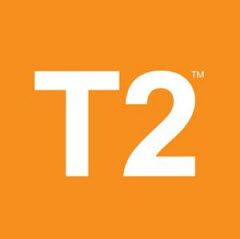
COLLINGWOOD, Victoria – Unilever kicked off their retail shop game with a Lipton store 15 years ago but later fumbled the ball in Belgium and stumbled with Bru World Cafes in India. Last week’s surprise acquisition of T2, Australia’s top specialty tea retailer, puts Unilever’s retail team back in the game.
Unilever has much to learn from T2, a premium tea retailer founded in 1996 by Maryanne Shearer in Fitzroy, Australia. The company currently operates 40 stores, mainly in Melbourne. T2 reported 12-month sales of $52.5 million through June of this year. The tea company offers a range of blended teas found in specialty grocery as well as many leading cafes, restaurants and hotels in Australia and nearby Asian countries. The company, which employs 300, opened 11 retail stores in the past year including its first in New Zealand and “has been growing double-digit and has significant potential,” according to the Unilever press release announcing the deal Friday, Sept. 6. The purchase price was not disclosed.
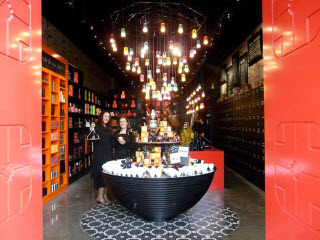
The acquisition “will allow us to bring the benefits of scale and access to new markets to the T2 business and for both businesses to share tea category expertise,” said Unilever’s President of Refreshment Kevin Havelock.
“We also like the fit with T2, bringing a fast-growing, premium tea business to complement our portfolio that we can leverage like we have done with other acquisitions in other categories (e.g. TRESemme that came with the Alberto Culver acquisition and which we have quickly launched in new countries like Brazil and Indonesia),” added Trevor Gorin, Unilever Head of Global Media Relations.
“We are delighted that we have found a home for T2 that has such a depth of knowledge of tea and has pioneered sustainability in the industry,” said T2 Managing Director Shearer. “Both I and the T2 team are looking forward to working alongside new colleagues in Unilever’s tea business to realize the full potential of the business we have spent the last 17 years building.”
Dynamic Business reported that “Shearer’s teas enjoy cult-status amongst connoisseurs and modern drinkers alike, and she’s built a booming retail business at a time when many are folding… using her product development and visual merchandising skills (Shearer) created a retail experience Australians hadn’t seen before.”
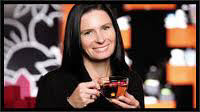
Shearer, 50, who has twin boys and a 12-year-old daughter, is recognized as one of Australia’s top entrepreneurs. She operated a homeware company prior to founding T2 and worked in the fashion and interior design industry early in her career.
“Maryanne Shearer has created a whole new retail category and built a powerful brand in her T2 business,” said Janet Holmes à Court, chair of the Australian judging panel that awarded Shearer the 2012 Veuve Clicquot Business Woman Award.
“What was the hardest part about establishing T2?” Dynamic Business asked her in 2012.
“In the beginning it was convincing everyone that a retail tea concept was a viable business idea, then once we were trading and the idea took off, it was understanding the importance of a healthy business and finding the balance between left and right brain priorities,” she answered.
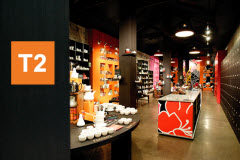
Shearer clearly gets it. T2’s teaware selection is functional with vibrant eye-catching design. Her first shop featured daily in-store tastings, open canisters displayed on tables and staff trained to encourage customers to smell, touch and compare teas. The shops are a model of what is unfolding in the United States and a tested platform for Lipton to expand globally.
While the company is smaller than either the 100-store DAVIDsTEA headquartered in Montreal, Canada or the 300-store Teavana, T2 similarly pioneered the winning retail concept in its home market and is now Australia’s leader in specialty tea.
Blends like Strawberries and Cream (which retails for $31 for 250 grams) and Citrus Punch ($12.80/100 g), Organic Chai ($12.40/100 g) and orthodox teas like Iron Goddess of Mercy ($45/100 g) are marketed at prices familiar to Teavana or DAVIDsTEA customers. Stores feature a tea wall, offer samples and tastings as well as more formal personalized training for their best customers.
The hip three-tiered loyalty program rewards 25 credits after $500 in purchases. Points are worth $1 each and redeemable in-store and online. T2 customers are invited to the Secret Tea Society after buying $2,500 in goods, a threshold that earns private tea training and “a multitude of niceties.”
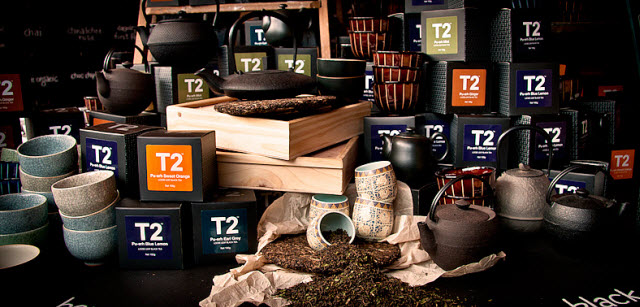
Last November Starbucks paid $620 million for Teavana, a publicly traded company with margins superior to the coffee giant. Acquiring T2 (regardless of price) is a potential game-changer for Unilever which is not known for its loose leaf offerings and must expand its range to include premium tea brands. The T2 brand will add retail dollars to an already lucrative Australian portfolio that includes 125-year-old Bushells, a national brand founded in Queensland.
See: How much of a premium does it take to make premium tea special?
According to Euromonitor International, the Lipton and Bushells brands led Australia’s tea market in 2012 with 31% off-trade value share.
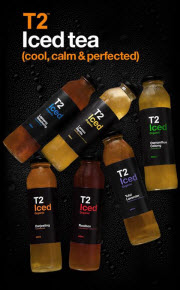
“Despite gaining in actual sales terms, Unilever’s value share slipped one percentage point from 2011, as the instant tea category expanded beyond Lipton Chai Latte and Bushells, resulting in the company’s off-trade value share dropping from 66% in 2011 to 58% in 2012 within instant tea despite gains in actual sales terms.
Details on the market can be found in the April 2013 report: Tea in Australia.
The purchase brings to mind Lipton’s two-year experiment in tea retail in Old Town Pasadena, Calif. The Lipton Tea House opened in 1997 with 52 kinds of loose leaf teas unavailable in other channels. The storefront’s light wood and chrome interior resembled Starbucks coffee houses. Patrons could order scones and a tea latte ? made from tea, milk, cinnamon and other spices.
“The idea is to show consumers how interesting and diverse tea can be,” Gasper Ferraro, then-director of finance for Lipton’s food service division, told London-based Design Week in February 1999.
The venture could not meet revenue targets and was closed in 1999. Unilever’s Bru World Café a small chain of coffee shops that opened in July 2011 in Mumbai, now with three locations, continues to struggle. These attempts at store front retail and a European retail concept that failed in Belgium take on new relevance as Starbucks tweaks the already-successful Teavana model, with plans to expand into urban and suburban lounges in America as well as overseas.
Rumors this time last year predicted Unilever would open retail tea shops in Britain in 2013. Will Unilever instead supercharge T2’s already ambitious expansion plans?
Tea is a strategically important category for Unilever Australia, said Unilever Australasia chairman, Clive Stiff, “Our Lipton and Bushells brands are two of Australia’s oldest and best loved tea brands … We know tea drinkers are increasingly looking for new and diverse tea flavors, so we are delighted to be bringing T2’s premium and exciting range into the fold. T2 is a great Australian success story – a story that we now intend to continue with Unilever.”
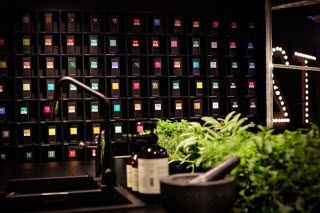
The company website notes: “T2 has unfurled and blossomed over the last 17 years, and now sells enough tea per month to make 8 million cups!”
Australia has a population of 22.7 million who share a British tea habit that once rivaled the motherland. Per capita tea consumption was 2.67 kilos in 1964 but dropped by half to 1.3 kilos in 1985 as coffee became popular and soda sales rose to 73.10 liters per person. Consumption at half a kilo still lags the 1.9 kilos per capita consumed in the U.K., according to statistics compiled by the Food and Agriculture Organization of the UN.
Tea is making a strong showing in the market with a health and wellness message that resonates with young people, according to Shearer who credits travel for inspiring her creativity.
“Creating a wonderful taste experience with teas from all over the world gives T2 the opportunity to educate, excite and surprise T2’s customers,” she writes. “The customer experience is always our priority and that’s why we love what we do.”
Online the company states that: “Tea lies at the very heart of the T2 philosophy. Sourced from all over the globe, there are over 200 teas in our ever-expanding range, embracing all varieties. From the fanciful flavors and scents of herbal and fruit tisanes, to the revered tender white teas, the herbaceous greens, to the strong and heady popular blacks, the T2 tea range is multifaceted and full of adventure.”
The acquisition is subject to customary closing conditions, according to the release. Learn more.
Export News
HAMILTON, New Zealand – Zealong Tea Company continues in business despite reports of its demise, according to its owners.
The miscommunication stems from the arrival of bulldozers at the estate’s original farm on the northern edge of Hamilton. The 27-acre parcel was sold to residential developers following complaints from neighbors that the company used noisy helicopters to combat frost on the fragile leaves of its oolong stock.
Spokeswoman Gigi Crawford told NZ Farmer that the Gordonton house and Discover Tea experience remain in operation. Ten years ago when planted the farm was well removed from housing. It was subsequently zoned for residential use. Neighbors in the vicinity complained at the use of helicopters to circulate air and prevent frost damage.
The company which exports premium organic oolong and other teas to Asia and Europe will focus its attention on developing lands near Gordonton, investing up to $5 million in a new visitor center and leaf drying plant, according to Crawford.
Health
HOBART, Tasmania – A doctoral student at the Menzies Research Institute has demonstrated green tea prevents rats from getting diabetes.
Helena Ng, a doctoral candidate at the Institute, told The Daily Telegraph that her discovery in rats was made possible by a new test that detects early signs of diabetes. Her work adds to studies that suggest components in green tea may prevent, but not cure diabetes.
Rats fed an unhealthy diet that normally led to the early stages of diabetes avoided the condition when the diet included concentrated green tea, the equivalent of 200 cups a day.
Tea Biz serves a core audience of beverage retailers in the belief that insightful journalism is one of the most effective forms of professional education. We write about what matters along the entire supply chain, emphasizing trustworthy sources and sound market research while discarding fluff and ignoring puffery. If there is nothing we can add to your understanding of the issue, we leave it alone.
Tea Biz posts are available to use in your company newsletter or website. Purchase reprint and distribution rights for single articles or subscribe. Custom content available. Click here for details.

